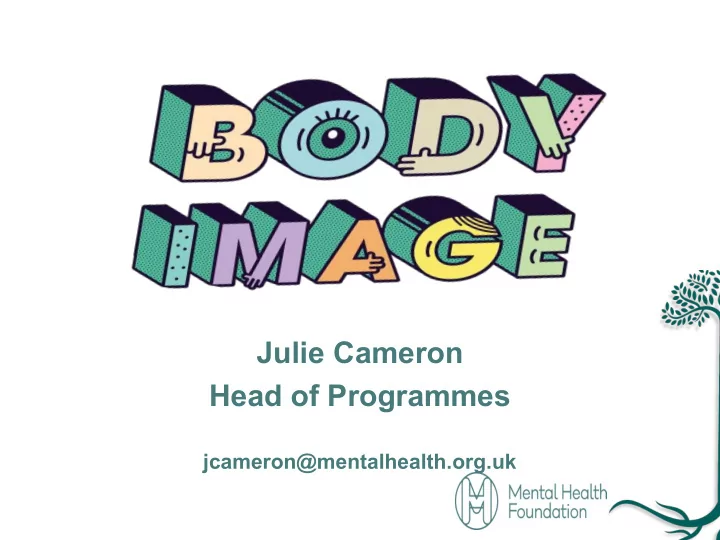

Julie Cameron Head of Programmes jcameron@mentalhealth.org.uk
Our vision is for a world with good mental health for all. Our mission is to help people understand, protect and sustain their mental health.
What do we do? Conduct research and Amplify voices of those share evidence with direct experience Focus on prevention in mental health – for everyone, those at risk, and those with mental health problems So that we can… Develop and test Offer people resources Influence policy to address and information to improve community programmes wider factors affecting their mental health that change lives mental health
Monday 13 th to Sunday 19 th May Theme: Body Image How we think & feel about our bodies
Because people say it is important: 16-25 year olds identified it as the 3 rd biggest challenge - facing young people - In our PanelBase survey, 27% of 10-19 year olds said they “always” or “often” worry about their body image - YouGov poll 25% of Scottish adults have felt “disgusted” and similar felt “shame” - As a society a great deal of importance is placed on our appearance
Because it can affect our mental health and wellbeing Feeling dissatisfied with your body has been linked to: - Low self-esteem - Symptoms of anxiety and depression - Disordered eating and eating disorders
A mix of influences including media, family and friends, and pressure from peers. - Pressure to live up to an ideal body type/shame when feel not meeting this standard – looks and feels different between genders - Using more social media has been linked to feeling less satisfied with body - Key transitional points in body shape and ability i.e. puberty, pregnancy, older years also chronic illness etc - Protected characteristics?
Supportive Parents - Model positive behaviour around body image, healthy eating, and physical activity - Praise children on qualities unrelated to physical appearance - Show that people have value and deserve respect regardless of body size or shape - Support children to express emotions and communicate their feelings about their bodies - Support children online to balance independence and safety
Good Friendships - Over half of UK 11-16 year olds experienced bullying about their appearance - Strong, supportive friendships may be protective for body image and self- esteem
Being mindful of our language • Speaking in ways that reinforce the idea that weight and shape is central to attractiveness and value may increase body dissatisfaction. Examples: “I feel fat today”, “They don’t have the body to wear that” Supportive social media sites • Options to hide followers, likes and comments
Learning about body image & being media- critical - 76% of students said learning about body confidence in school made them feel more confident about themselves - Classroom based body image programmes can have positive impacts on body image - Media literacy can help protect against effects of images on media and social media
- SG Advisory Group on Healthy Body Image - Children’s parliament and youth parliament looking to develop guidance for healthy social media use for and by y.p - Consultation on increased powers of ASA (led from Westminster) - Industry restrictions on Under 18’s seeing adverts for cosmetic surgery and weight loss products. - Inquiry into duty of care for reality TV stars
Recommend
More recommend